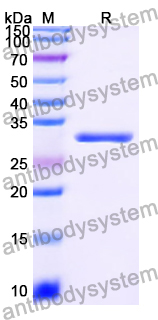Catalog No.
YHN44202
Expression system
E. coli
Species
Homo sapiens (Human)
Protein length
Arg1929-Asn2070
Predicted molecular weight
33.64 kDa
Nature
Recombinant
Endotoxin level
Please contact with the lab for this information.
Purity
>90% as determined by SDS-PAGE.
Accession
Q9UMZ3
Applications
ELISA, Immunogen, SDS-PAGE, WB, Bioactivity testing in progress
Form
Lyophilized
Storage buffer
Lyophilized from a solution in PBS pH 7.4, 0.02% NLS, 1mM EDTA, 4% Trehalose, 1% Mannitol.
Reconstitution
Reconstitute in sterile water for a stock solution. A copy of datasheet will be provided with the products, please refer to it for details.
Shipping
In general, proteins are provided as lyophilized powder/frozen liquid. They are shipped out with dry ice/blue ice unless customers require otherwise.
Stability and Storage
Use a manual defrost freezer and avoid repeated freeze thaw cycles. Store at 2 to 8°C for frequent use. Store at -20 to -80°C for twelve months from the date of receipt.
Alternative Names
Phosphatidylinositol phosphatase PTPRQ, R-PTP-Q, PTP-RQ, PTPRQ, Receptor-type tyrosine-protein phosphatase Q
Taperin bundles F-actin at stereocilia pivot points enabling optimal lifelong mechanosensitivity., PMID:40471101
Whole-genome sequencing, as a powerful diagnostic tool in hearing loss, reveals novel variants in PTPRQ missed by whole-exome sequencing., PMID:40165225
A Novel PTPRQ c.3697del Variant Causes Autosomal Dominant Progressive Hearing Loss in Both Humans and Mice., PMID:39434500
Novel PTPRQ variants associated with hearing loss in a Chinese family PTPRQ variants in Chinese hearing loss., PMID:39205941
Mutation spectrum of hearing loss patients in Northwest China: Identification of 20 novel variants., PMID:38860500
A cell type-specific approach to elucidate the role of miR-96 in inner ear hair cells., PMID:38826689
Detailed Clinical Features of PTPRQ-Associated Hearing Loss Identified in a Large Japanese Hearing Loss Cohort., PMID:38674423
Critical role of TPRN rings in the stereocilia for hearing., PMID:37952086
Analysis of the Mutational Landscape of Osteosarcomas Identifies Genes Related to Metastasis and Prognosis and Disrupted Biological Pathways of Immune Response and Bone Development., PMID:37445641
Identification of potential prognostic markers for lung adenocarcinoma using comprehensive analysis., PMID:37350390
Delayed progressive sensorineural hearing loss due to a novel compound heterozygous PTPRQ mutation in a Chinese patient., PMID:37106574
Biallelic mutations in pakistani families with autosomal recessive prelingual nonsyndromic hearing loss., PMID:36472766
Mutational and transcriptional alterations and clinicopathological factors predict the prognosis of stage I hepatocellular carcinoma : Prediction of stage I HCC prognosis., PMID:36153509
Targeted Next-Generation Sequencing Identified Novel Compound Heterozygous Variants in the PTPRQ Gene Causing Autosomal Recessive Hearing Loss in a Chinese Family., PMID:35899188
Clinical Validation of Genome Reference Consortium Human Build 38 in a Laboratory Utilizing Next-Generation Sequencing Technologies., PMID:35869940
Transcriptome Analysis of Breast Muscle Reveals Pathways Related to Protein Deposition in High Feed Efficiency of Native Turkeys., PMID:35625086
Protein Tyrosine Phosphatase Receptor-type Q: Structure, Activity, and Implications in Human Disease., PMID:35546749
Grxcr1 regulates hair bundle morphogenesis and is required for normal mechanoelectrical transduction in mouse cochlear hair cells., PMID:35235570
Novel FERMT3 and PTPRQ Mutations Associated with Leukocyte Adhesion Deficiency-III and Sensorineural Hearing Loss., PMID:38162163
PNPT1, MYO15A, PTPRQ, and SLC12A2-associated genetic and phenotypic heterogeneity among hearing impaired assortative mating families in Southern India., PMID:34374074
A Genome-First Approach to Rare Variants in Dominant Postlingual Hearing Loss Genes in a Large Adult Population., PMID:34281439
Hearing Sensitivity of Primates: Recurrent and Episodic Positive Selection in Hair Cells and Stereocilia Protein-Coding Genes., PMID:34137817
Identification of Hearing Loss-Associated Variants of PTPRQ, MYO15A, and SERPINB6 in Pakistani Families., PMID:33997018
Whole-exome sequencing identified a novel heterozygous mutation of SALL1 and a new homozygous mutation of PTPRQ in a Chinese family with Townes-Brocks syndrome and hearing loss., PMID:33478437
Ultrarare heterozygous pathogenic variants of genes causing dominant forms of early-onset deafness underlie severe presbycusis., PMID:33229591
Protein tyrosine phosphatase receptor type Q in cerebrospinal fluid reflects ependymal cell dysfunction and is a potential biomarker for adult chronic hydrocephalus., PMID:33035386
Spectrum and frequencies of non GJB2 gene mutations in Czech patients with early non-syndromic hearing loss detected by gene panel NGS and whole-exome sequencing., PMID:32860223
First confirmatory study on PTPRQ as an autosomal dominant non-syndromic hearing loss gene., PMID:31655630
Hereditary hearing loss; about the known and the unknown., PMID:30665849
Hair-Bundle Links: Genetics as the Gateway to Function., PMID:30617060
Autosomal Recessive Congenital Sensorineural Hearing Loss due to a Novel Compound Heterozygous PTPRQ Mutation in a Chinese Family., PMID:29849575
Deafness and vestibular dysfunction in a Doberman Pinscher puppy associated with a mutation in the PTPRQ gene., PMID:29460419
A C-terminal nonsense mutation links PTPRQ with autosomal-dominant hearing loss, DFNA73., PMID:29309402
PTPRQ as a potential biomarker for idiopathic normal pressure hydrocephalus., PMID:28714010
Phosphotyrosine phosphatase R3 receptors: Origin, evolution and structural diversification., PMID:28257417
RNA Sequencing Analysis Reveals Interactions between Breast Cancer or Melanoma Cells and the Tissue Microenvironment during Brain Metastasis., PMID:28210624
The Tetraspanin-Associated Uroplakins Family (UPK2/3) Is Evolutionarily Related to PTPRQ, a Phosphotyrosine Phosphatase Receptor., PMID:28099513
High PTPRQ Expression and Its Relationship to Expression of PTPRZ1 and the Presence of KRAS Mutations in Colorectal Cancer Tissues., PMID:26851024
Tissue-specific epigenetics in gene neighborhoods: myogenic transcription factor genes., PMID:26041816
Identification of Two Novel Compound Heterozygous PTPRQ Mutations Associated with Autosomal Recessive Hearing Loss in a Chinese Family., PMID:25919374
Novel PTPRQ mutations identified in three congenital hearing loss patients with various types of hearing loss., PMID:25788564
Identification of a novel compound heterozygous mutation in PTPRQ in a DFNB84 family with prelingual sensorineural hearing impairment., PMID:25557914
Copy number alterations of chromosomal regions enclosing protein tyrosine phosphatase receptor-like genes in colorectal cancer., PMID:25169130
Whole genome analyses of a well-differentiated liposarcoma reveals novel SYT1 and DDR2 rearrangements., PMID:24505276
A reduction in Ptprq associated with specific features of the deafness phenotype of the miR-96 mutant mouse diminuendo., PMID:24446963
CLIC5 stabilizes membrane-actin filament linkages at the base of hair cell stereocilia in a molecular complex with radixin, taperin, and myosin VI., PMID:24285636
Identification of novel PTPRQ phosphatase inhibitors based on the virtual screening with docking simulations., PMID:23981594
Structural basis for the dephosphorylating activity of PTPRQ towards phosphatidylinositide substrates., PMID:23897475
Large membrane domains in hair bundles specify spatially constricted radixin activation., PMID:22457506

